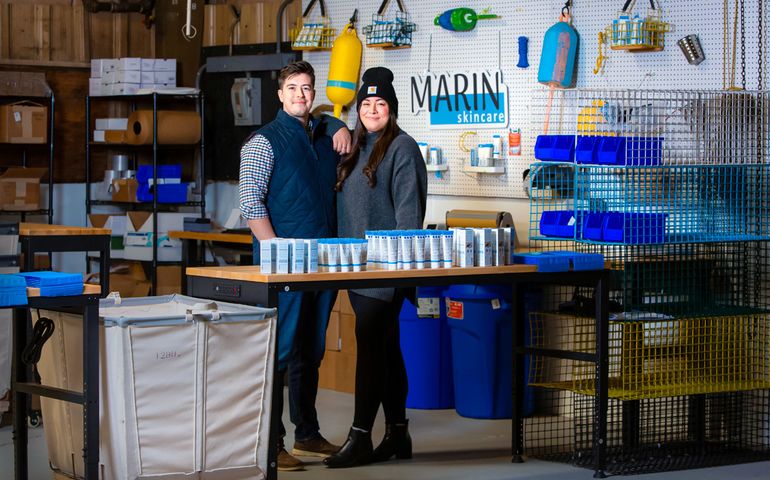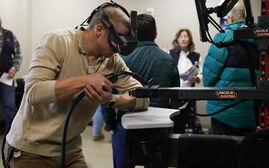Marin Skincare uses an ingredient grown in Maine waters — lobster
 Photo / Tim Greenway
Patrick Breeding and Amber Boutiette, founders of the startup Marin Skincare, at the cosmetic firm’s shipping location.
Photo / Tim Greenway
Patrick Breeding and Amber Boutiette, founders of the startup Marin Skincare, at the cosmetic firm’s shipping location.
Marin Skincare is a true Maine story inspiried by what Maine may be best known for — lobster.
Patrick Breeding was a biomedical engineering grad student at the University of Maine when, with his co-founder Amber Boutiette, started working with proteins called glycoproteins found in lobsters.
For years, Breeding had watched Boutiette struggle with eczema. She tried various products, including steroids, but could not find relief. They realized the glycoproteins found in lobsters could be a potential remedy.
They founded a product, Marin Skincare, for dry, aggravated skin associated with eczema, psoriasis and other dermatitis conditions.
Like a lot of startups, it went through a few ups and downs.
How it started
Breeding’s journey started in 10th grade.
“My dad was diagnosed with stage 4 cancer, and it really woke me up to, ‘OK, this is a real-life thing, and bad things happen in the world.' You can choose to show up and be a force of good through being there for someone, an act of service or creating something to help others,” Breeding says.
“Amber’s approach was highly driven by her own eczema,” he adds. “Throughout college, I watched her struggle with dry, itchy skin all over her body, especially on her face, where she couldn’t hide it. I saw her hide it through scarves, hats and hoodies. You have this bright, energetic, fun-loving person living in a kind of depression in addition to all the physical pain that eczema causes.”
That wish to help people materialized when Robert Bayer, a former director of the UMaine Lobster Institute, discovered that lobster glycoprotein might help treat eczema. Glycoproteins are naturally abundant in lobsters and other marine resources, says Breeding. They help repair and protect the lobster’s outer barrier from physical and environmental stressors while also playing a critical role in balancing the internal health of the lobster.
Based on Breeding's lab findings, he hypothesized that glycoprotein could be used to hydrate the skin. In the same way the protein could help lobsters regenerate a limb, it could also help Boutiette’s eczema issue. They did a patch test using vaseline and glycoprotein, and within a week her eczema clear up.
Get-up-or-give-up moment
Breeding had heard of Luke’s Lobster and gave Luke Holden, its founder and CEO, a call. Soon after, Holden and Breeding collaborated on a method to collect glycoprotein from lobsters at Luke’s Lobster’s Saco processing plant.
For a month, Boutiette and Breeding worked every day, from 5 a.m. to 3 p.m., to collect the glycoprotein in glass jars, putting them in the freezer. Once they had enough, the plan was to transport the freezer to a manufacturing plant.
Through Holden, they identified a manufacturer for the skin cream: Ariel Laboratories in South Plainfield, N.J., a privately held firm that specializes in product development and manufacturing of personal care and cosmetics.
“We dropped them off and were like, this is amazing. We can’t wait to make our first-ever product,” Breeding says.
Breeding got a call a week later from the manufacturer telling him that when they moved the freezer, all the glass jars broke. This left the product unusable and with little glass shards throughout it, which left round one of manufacturing destroyed.
“All the stuff we spent our whole time and a month’s rent we paid. We didn’t make any money and didn’t have another job. We had a few months’ worth of savings and the money in the business,” he says.
Boutiette and Breeding returned and collected more proteins but had to do so quickly. They needed more money. Breeding called in a favor to their group of friends. So they continued with the 5 a.m. to 3 p.m. grind again; luckily, this round only took two weeks.
“It was the bane of my spiritual and emotional existence for a while,” Breeding says.
A week later, Breeding got the sample of the batch they had already made with the ingredients from the week prior. This happy moment took a turn for the worst when they discovered an error, a typo in the type of formula they were supposed to make, which resulted in the wrong product being made.
“That was the point where it was like, well, do you want to go get normal jobs, or do you want to keep doing this and for us, nothing was going to stop us from launching this,” he says. “We have never questioned, ‘Will this business work?’ or anything like that because we saw it change Amber’s life.”
The founders didn’t give up. They recruited more friends in collecting the glycoproteins, and they were able to send the lab more protein. After the third attempt, they finally had their first batch of skincare. In early October 2021 the first batch of the product, branded as Soothing Hydration Cream, came off the line. Within two months, the product sold out.
Funding
During the early stages of the brand, Breeding developed the skill of stock trading. This skill allowed him to pay for rent while their money was tied up in building the brand and extending the launch from July to October.
“Later on in our business, this really helped out because we launched, we sold out within two months, the business started taking off — and we didn’t quite want to bring on investors yet,” Breeding recalls. “So I used the money I made trading to collateralize the capital loan, and that was a great boost to the cash position. It decreased our net income this past year, so we didn’t have to pay much in taxes, and it allowed us to continue to grow the business.”
Breeding and Boutiette received a $25,000 grant from the Maine Technology Institute and a $5,000 grant from the Libra Foundation. The company won a $14,000 grant as part of Maine Sea Grant’s Buoy Maine pitch competition and raised angel funding.
The future
“In the first year, the business has grown so much,” says Breeding.
The company did over seven figures in revenue.
In the next two years, the company will go from a small business to a medium business, and it has been growing extremely quickly.
The company has three full-time employees and three part-time employees. They are about to hire in the next quarter by the end of quarter one a marketing manager and a video content creator to focus on TikTok and Instagram reels to continue to blow up the business via viral videos.
The company has moved from Breeding and Boutiette’s home in South Portland to an office and warehouse on Riverside Street in Portland with a lab where testing is done on the glycoproteins.
“We will be launching a few new products,” said Breeding. “One will be a game-changing product for the scalp, which is the most requested product: Shampoo or scalp serum for scalp and dermatitis.”
“The thing I am the most excited about is that we have been working for over a year now on this, and we are going to launch it in August of this year,” Breeding says. “We are going to launch a rebrand. We are going to evolve the brand to combine modern, clean skincare with heritage Maine into this brand that can sit on shelves at CVS and Target just as much as it could at Whole Foods or L.L.Bean, so sticking true to our heritage Maine roots but being the nationally recognized go-to for dry and damaged skin.”













0 Comments